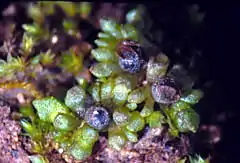Sphaerocarpos texanus
Sphaerocarpos texanus, the Texas balloonwort,[2] is a species of liverwort in the Sphaerocarpaceae family, found in the Americas, northern Africa and Europe.
| Sphaerocarpos texanus | |
|---|---|
 | |
| Female plants of Sphaerocarpos texanus bearing mature sporophytes. | |
| Scientific classification | |
| Kingdom: | |
| Division: | |
| Class: | |
| Order: | |
| Family: | |
| Genus: | |
| Species: | S. texanus |
| Binomial name | |
| Sphaerocarpos texanus | |
| Synonyms | |
|
Sphaerocarpus berterii Aust., 1873 | |
Description
Sphaerocarpos texanus are small, thalloid, dioecious liverworts.[3] The species is sexually dimorphic, with male plants usually 3–5 mm in diameter, females up to 12 mm in diameter.[4] Both male (bearing antheridia) and female (bearing archegonia) plants are bright green, with the thallus branching up to several times.[3] The plant is a winter annual, appearing in autumn and dying in spring.[4] Notably, the spores occur in sets of four, called tetrads. Unlike most other species of liverwort, the spores stay in these tetrads until they germinate.[3][4]
Habitat
The plant is found on flat, lightly shaded soil. Usually by roadsides.[3]
Distribution
Sphaerocarpos texanus has a wide range, probably the widest of any species in its genus. It has been found on several continents, in the United States, Uruguay, England, Germany, France and Morocco.[3]
References
- Austin, C. F. (1877). "New Hepaticae". Bulletin of the Torrey Botanical Club. 8: 157–158.
- Edwards, Sean R. (2012). English Names for British Bryophytes. Special Volume - British Bryological Society. British Bryological Society Special Volume. 5 (4 ed.). Wootton, Northampton: British Bryological Society. ISBN 978-0-9561310-2-7. ISSN 0268-8034.
- "Sphaerocarpos hians sp. nov., with a revision of the genus and illustrations of the species". Bull. Torrey Bot. Club. 37, 5: 215–230. 1910.
- "Sex-specific germination response in the liverwort Sphaerocarpos texanus (Sphaerocarpaceae)". Bryologist. 104, 1: 69–71. 2001.